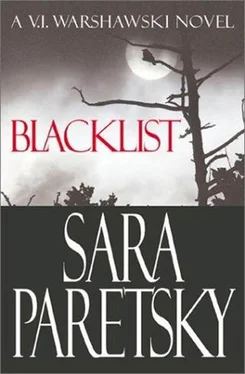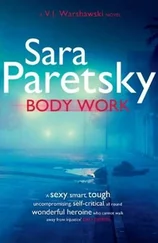and asked if she’d found anything useful about the Committee for Social Thought and Justice.
She grinned. “I thought we’d never get around to that. That meeting in Eagle River, the one Olin Taverner was interrogating Bayard about, well, Kylie Ballantine was there-“
I sat up again. “What? You found it in the Congressional Record?” She shook her head. “The University of Chicago archives.”
She leaned over to pull a sheaf of papers from her briefcase and laid them on the table. Harriet and I bent over them, trying to read them by the flickering bar lights, but couldn’t make out them out.
I signaled to the waitress for the check, but Harriet took it from me. “You’ve run yourself ragged for me and my family; the least I can do is buy you a glass of Scotch.”
She signed the bill to her room and the three of us went out to the lobby, where we looked at the documents Amy had photocopied. One was a photograph, blurry in reproduction, that showed a group of African tribal dancers. You couldn’t tell sex, let alone identity, because of the masks everyone was wearing. But stapled to the picture was a letter on Olin Taverner’s stationery, dated May 1957, to the president of the university.
This photograph was taken on June 14, 1948. It shows Kylie Ballantine and her Ballet Noir de Chicago performing at a benefit for the Legal Defense Fund of the Committee for Social Thought and Justice. This committee is a major supporter of known Communists in the arts and letters. A number of university trustees are my clients. They are deeply disturbed to find that Ballantine is actually teaching at the university. I don’t know what students are learning in her classes, but if parents saw this photograph, and knew that their children were being taught by someone who not only supports Communism but engages in sexually explicit dancing, I doubt they would want them studying at the university-even one with the University of Chicago’s leftist leanings.
Handwritten at the bottom of the letter was the phrase, “Get someone to deal with this.”
“So Taverner got Kylie fired,” Amy said. “That’s probably why Marc went out to see him.”
“Is there any evidence that Marc saw this letter?” I asked.
She grinned again. “Yes, because you have to sign into the rare books and archives room-not like the rest of the library, where you go in and out on your ID. Marc had been there about three days before he met Olin Taverner.”
“But this doesn’t prove anything,” Harriet objected. “You can’t tell where this was taken, or who was in it. How could they fire her just because of that?”
“America in 1956, baby,” Amy said. “Communist? Black? You only needed to whisper it once.”
Bedside Manner
Catherine, you’re lucky to be alive. The sheriff’s police may have been reckless-we agree they were way out of line, and we’ll take appropriate action-but don’t try to hide behind that with me. I know you’re in pain, but I also know you’re lying.”
Whoever was speaking had a penetrating baritone; it carried easily through the hospital door, which wasn’t quite shut. The volunteer looked dubiously from a vase of flowers in her hand to the door.
“I’ll take those in for you,” I offered.
She smiled gratefully and handed off the flowers. Before the private guard stationed outside the door could object, or ask me to identify myself, I was in the room.
I had spent the night at the Drake. It wasn’t just that I was too tired to take another step, but the thought of going to bed at home under the watchful eyes of the law made my skin crawl. The hotel had toiletries for forgetful travelers like me; I took a toothbrush, toothpaste and comb from the front desk. I had just enough brain function left to call Mr. Contreras so he wouldn’t rouse Freeman, and fell deeply and totally asleep.
When I woke the next morning in the pleasant, unfamiliar room, I felt a familiar unpleasant stiffness. I groaned my way out of bed to start stretching, and then lay back down, calling the concierge from bed to arrange for a massage. I’d worry about the bill when my American Express statement came next month.
Breakfast in bed. An hour in the hotel spa, followed by a massage and a makeup treatment. When I put my jeans and sweater back on, I almost looked as though I belonged on the Gold Coast. More to the point, I could move my arms without feeling like someone was sticking a knife into my back.
Before checking out, I went into the hotel florist and charged an attractive little bouquet to my room. I added a floppy-eared dog. Adorable. Only another sixty-five dollars on a bill long enough that I shoved it into my pocket witlvbut inspecting the total.
The Drake is only a few blocks from Northwestern Hospital, where Catherine Bayard had been sent. I walked south to the hospital along the lakeshore, the wind tearing at the paper around the flowers. Whitecaps danced up to the breakwater like daredevils, advancing, retreating. Fists of clouds tumbled across the horizon. The air was sharp. I was happy to be alive and walking.
At the hospital, I found that the Bayard family was guarding Catherine’s privacy; the clerk at the information desk wouldn’t give out her room number. I didn’t argue, just nodded and handed over the flowers. The clerk put them on a shelf with a bunch of other offerings.
I retreated to a curtained alcove by the front entrance until a volunteer came by to load flowers onto a cart. After that, it was simply a matter of following the flop-eared dog up elevators and down corridors as the volunteer made deliveries. Catherine’s room turned out to be the last one on the route, at the end of a long hall of private rooms. Most of those we passed had their doors firmly closed, but I could see into some, where the chintz curtains and couches made the rooms look more like the high-end hotel I’d just left, not a hospital.
The room I entered was charming, with armchairs upholstered in the same gold-flowered brocade as the curtains. Visitors could eat or read at the polished side table. The girl in the hospital bed, her shoulder swathed in bandages, her arm attached to an IV, struck a discordant note. So did the man shouting at her; in this setting, one expected visitors to behave with decorum.
“That Arab boy worked at your school. Don’t expect me to believe it’s a coincidence that he was hiding out in-” He broke off midsentence, as Catherine, who had looked dopily toward the opening door, recognized me and gave an involuntary gasp.
The shouter also turned to look. He was a lean, tanned man about my age, in a crewneck sweater and jeans, with a shock of thick dark hair. He ordered me to put the flowers down and leave, but I stood rooted to the floor, water slopping over the flop-eared dog onto my hand.
“Just who are you?” I demanded.
“Who am IF’ he yelled. “Who the hell are you, barging in here?”
He strode over to me, grabbing my arm in an effort to propel me out. I leaned against him, a dead weight that made him stagger.
“We met in Olin Taverner’s apartment Thursday night,” I said. “Now, tell me who you are, and why you’re in this hospital room.”
He let go of me so fast that the rest of the water sloshed out of the vase. “I wasn’t-who are-” he stammered.
“You may not have seen my face, but I saw yours,” I said, my voice a nasty whisper. “My next call is to the cops. Your prints must be all over that desk drawer you jimmied. What was in it?”
“Father,” Catherine Bayard said from the bed in the thread of a voice. “It’s my father.”
We both turned toward her, guilty that we’d forgotten her lying there. I should have realized he was Catherine’s father from the snatch of diatribe I’d overheard, but I’d been too amazed at seeing Thursday’s head-butter to think clearly.
Читать дальше












